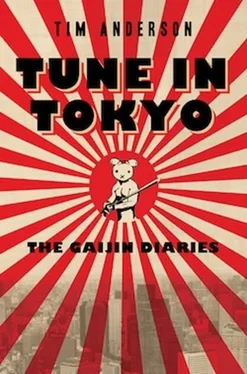But my heart really belongs to Ryuji, who the other day successfully got me to say the word “sex” by telling me to say the letter X five times fast. I knew where he was going with this, but I did it anyway to humor him and myself. He laughed at me for “saying bad word,” then asked me what it meant.
“Um, it’s a little hard to explain,” I said.
“Is it like ‘poop’?” he asked as he folded the phone bill into a paper airplane.
“Yes,” I answered. “I guess sometimes it is.”
# of times shoes taken off before entering room: 841
# of times reprimanded for not taking shoes off before entering room: 1

Pat Benatar and Ann and Nancy Wilson’s favorite chapter.
If there’s one thing I’ve learned I can count on during my time on Planet Tokyo, it’s that every day I step outside my door provides me with a new opportunity to sit in judgment of an entire nation of people. Sure, I did that back home in the States too, but it’s a richer and more rewarding experience here because there’s no way I can be mistaken for those I judge. Most of the time.
The Japanese, like yours truly, are a beautiful, counterintuitive symphony of contradictions. They are responsible, anal-retentive recyclers, yet each day one Japanese person probably goes through an entire continent’s worth of plastic because they are completely obsessed with packaging: i.e., putting things in bags, then putting those bags in bigger bags, putting those bags in one final climactic bag, and so forth. They are hesitant to speak about contentious or embarrassing topics, yet I hear the word “diarrhea” used in conversations in my classroom with mystifying frequency (usually after someone asks, “How are you?”). And as is well-documented in these pages, they are painfully shy and try their best not to draw attention to themselves, yet they are the same people who invented and made immensely popular an arcade game called Dance Dance Revolution where the player must, in full view of others, gyrate and wiggle his body to electro music, mimicking as closely as possible the figure dancing on the screen, thereby gaining points and perhaps beating personal records. And my students shift uncomfortably and turn red when I ask them what they did last weekend?
The other night in the front of a Shinjuku sidewalk arcade I saw a man in shirtsleeves dancing on the Dance Dance Revolution platform as if his very life depended on it, face sweating, armpits drenched, expression determined. He stepped, twisted, kicked, and jumped like a kid on ecstasy at his senior prom. A crowd of people was gathered around to watch him dance and marvel at his high score. I wouldn’t say he danced with any inborn sense of rhythm or flair, but he knew the steps and could put his feet and arms where they were supposed to be at any given point in the dance. When he finished, folks clapped, a person handed him his suit jacket, he bowed graciously to everyone, tried his best to re-fashion his hair into its former slicked-back style, and walked down the street by himself, briefcase in hand, a slight spring in his step. He was probably off to English class, where he’d sit in the corner and not speak above a whisper for two hours.
The quintessential embodiment of this contradictory element of the Japanese character is their love of karaoke. There are few events in Tokyo that are announced with as much fervor and enthusiasm as the opening of a new karaoke venue. I was on my lunch break in Ginza one day and happened to pass by a karaoke place that was having its “Grand Opening Fun,” and I had to swerve to avoid the men dressed in giant blue bear costumes beating on drums, shaking tambourines, passing out flyers, and shouting the good news at the top of their lungs. There were also glittery dancing girls waving, as well as an accordion player.
We’ve all done karaoke. It’s an addictive and idiotic but fun thing to do while drunk, and a reliable way to publicly humiliate oneself/give the world a small taste of one’s undeniable talents. Most importantly, it’s the best way to prove once and for all that those countless and friendless hours spent in my bedroom listening to Top 40 radio during middle school when I should’ve been learning how to not fall off a skateboard were not wasted hours. Not at all. I know lots of lyrics!
My former MOBA colleagues and I used to go out karaokeing regularly to let off steam. Sometimes a Japanese worker would come along, but more often than not it was just us gaijin looking for our moment in the spotlight. One time, Donna had gotten enough beer in her to think she could take on Kate Bush’s “Wuthering Heights.” If you’re unfamiliar with this particular song, it may assist your understanding to know that Ms. Bush’s extremely high-pitched voice makes Betty Boop sound like Bruce Springsteen. She hit notes not scientifically proven to exist before this song scaled the heights of the British charts in 1979. In short, I didn’t think Donna was up to the challenge, and as it turned out, she wasn’t. It was like hearing Jennifer Lopez trying to sing Maria Callas. It was like hearing Jennifer Lopez trying to sing. One of our fellow teachers, Pete, picked up the other microphone and started singing along, obviously feeling that, well, somebody had to do something. But Donna, eyes closed, face shining, voice creaking, was having none of it, and with a flick of her dainty wrist, she knocked the microphone out of his hand and whispered in a tone of voice usually indicating demonic possession, “Shut up, it’s my song!”
But we couldn’t fault her. We all had the same agenda, i.e., to sing the song we wanted to sing and make everyone else listen. Next up was Big Bob from Wales, who always picked whatever Tom Jones song was in the songbook, especially if it was “The Green Green Grass of Home.” This night he surprised us by bogarting the remote control and programming in “Sex Bomb” followed by “God Save the Queen.” There he was, this huge white man standing up in a tiny room singing “and I am the antichrist!” while the television screen showed a short film of two Japanese lovers at an amusement park, twirling around, laughing, hugging, kissing, and then crying after their star-crossed separation.
As for me, I am probably the worst when it comes to using my time at the mic to make a dramatic personal statement and force everyone to sit and watch, awestruck, as I unfurl my very essence. My song choices naturally tend towards power ballad territory. I strongly believe that there is something deep within us human beings, a profound, inexplicable, emotive force that drives us to do things that we know may hurt other people, maybe even hurt ourselves. But life is full of such dilemmas, and I find it’s best to follow your heart wherever it may lead you. And if not your heart, then your beer buzz. And my karaoke beer buzz always leads me, coincidentally enough, to Heart. Not the biggest muscle in the human body; I’m talking about the legendary rock band led by siren sisters Ann and Nancy Wilson, the queens of the rock torch song, the mystical madams who helped get me through sixth grade. There isn’t an emotion too naked, an anger too vitriolic, a love too conflicted, or an animal metaphor too far-fetched for them to sing about atop a glassy piano refrain or a nasty guitar lick. I can’t help but respect that and to do my best to stay true to the original spirit of their songs when I grab one microphone for myself, turn the other one off and kick it on the floor, and open my vocal cords like a flower greeting the rising sun to push out the opening verse to “Magic Man,” “What About Love?” “Dream-boat Annie,” or “Barracuda.”
Читать дальше













